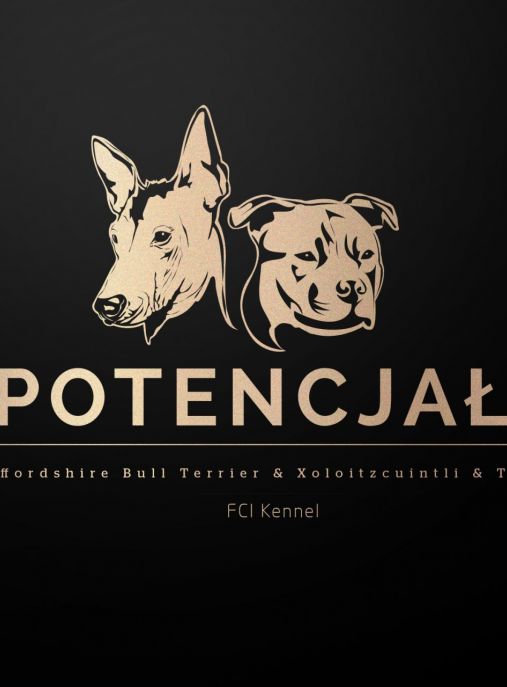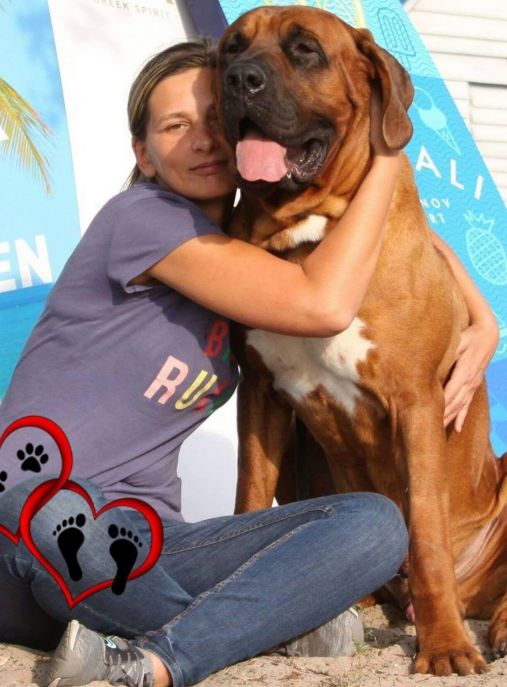The Tosa dog breed, also known as the Tosa Inu or Tosa Ken, is a majestic and powerful canine that hails from Japan. Renowned for its imposing size and strength, the Tosa is often referred to as the "Sumo wrestler of the dog world." With its regal appearance and loyal nature, the Tosa has gained popularity not only in its home country but also around the globe.
The history of the Tosa breed dates back to the mid-19th century in the Tosa region of Japan. It was during this time that dog fighting became a popular sport, and breeders sought to create a formidable canine competitor. The Tosa breed was developed by crossing various Japanese and European breeds, including the Shikoku Inu, Bull Terrier, Great Dane, and Mastiff, among others. The goal was to create a dog with exceptional strength, endurance, and fighting ability.
According to the FCI (Fédération Cynologique Internationale) typology, the Tosa breed falls under Group 2: Pinscher and Schnauzer - Molossoid and Swiss Mountain and Cattledogs. Within this group, the Tosa is classified as a Molossoid type dog. This classification highlights the breed's muscular build, large head, and strong jaw, which are typical traits of Molossoid breeds.
Tosa dogs are known for their loyalty and devotion to their families. They are incredibly protective and make excellent guard dogs. However, their gentle and calm nature also makes them suitable companions for experienced dog owners who can provide them with proper training and socialization. Due to their size and strength, Tosa dogs require a firm and consistent hand in training, as they can become dominant if not properly managed.
In terms of physical characteristics, the Tosa is a large and robust breed. Males typically weigh between 100-200 pounds (45-90 kg), while females generally range from 80-150 pounds (36-68 kg). The height of a Tosa dog can vary between 22-26 inches (56-66 cm) for males and 20-24 inches (51-61 cm) for females. These measurements, combined with their muscular build, give the Tosa an imposing presence.
The life expectancy of a Tosa dog is around 10-12 years, which is relatively average for a large breed. However, it is worth noting that Tosa dogs are prone to certain health issues, including hip dysplasia, gastric torsion, and heart conditions. Regular veterinary check-ups and a balanced diet are essential to ensure their overall well-being.
One interesting fact about the Tosa breed is its popularity in Japan, where it is considered a national treasure. In fact, Tosa dogs are often used in ceremonies and parades, symbolizing strength, loyalty, and bravery. Additionally, the Tosa breed has gained recognition in other countries, particularly in Europe and the United States, where enthusiasts appreciate their unique characteristics and noble demeanor.
In conclusion, the Tosa dog breed is a remarkable and imposing canine that has captivated dog lovers worldwide. With its rich history, powerful physique, and loyal nature, the Tosa is a breed that demands respect and admiration. Whether as a guardian or a companion, the Tosa's regal presence and unwavering loyalty make it a truly remarkable breed.
The Tosa dog, also known as the Tosa Inu, is a majestic and powerful breed that originated in Japan. With a rich history as a fighting dog, the Tosa has evolved into a loyal and gentle companion. This breed possesses a unique character that sets them apart from other dogs, making them a fascinating choice for experienced dog owners.
One of the most notable traits of the Tosa dog is their calm and composed demeanor. They are known for their stoic nature and rarely display aggression without provocation. This breed is incredibly loyal and devoted to their family, making them excellent protectors and guardians. However, their reserved nature means they may not be as outgoing or friendly towards strangers, requiring proper socialization from an early age.
Tosa dogs are intelligent and highly trainable, but they require a firm and consistent hand in their upbringing. Early socialization and obedience training are crucial to ensure they grow into well-rounded dogs. Positive reinforcement techniques work best with this breed, as they respond well to praise and rewards. Harsh training methods should be avoided, as it can lead to fear or aggression.
Despite their imposing size and strength, Tosa dogs are surprisingly gentle and patient with children. They have a natural affinity for their human family and are known to be excellent with kids. However, due to their size, supervision is necessary to prevent accidental injuries during playtime. Tosa dogs also tend to get along well with other animals if properly introduced and socialized from an early age.
Exercise is essential for the Tosa breed, as they have a moderate energy level. Daily walks, playtime, and mental stimulation are necessary to keep them physically and mentally satisfied. However, it is important to note that Tosa dogs are not well-suited for apartment living due to their size and exercise needs. A spacious yard or access to a secure outdoor area is ideal for this breed.
Grooming the Tosa dog is relatively low maintenance. Their short, dense coat requires regular brushing to remove loose hair and keep it looking healthy. Bathing should be done as needed, typically every few months, to keep their coat clean and odor-free. Additionally, routine dental care, nail trimming, and ear cleaning should be part of their grooming routine.
It is crucial to mention that owning a Tosa dog comes with great responsibility. Due to their history as fighting dogs, some countries have restrictions or bans on owning this breed. Potential owners should research and understand the legal requirements and regulations in their area before considering a Tosa dog.
In conclusion, the Tosa dog is a remarkable breed with a unique character. They are calm, loyal, and protective, making them excellent family companions. With proper training, socialization, and exercise, Tosa dogs can thrive in a loving and dedicated home. However, potential owners must be aware of the legal restrictions and responsibilities that come with owning this breed.
The Tosa dog, also known as the Tosa Inu, is a large and powerful breed that originated in Japan. These dogs are known for their strength, loyalty, and protective nature. If you are considering bringing a Tosa dog into your home, it is essential to understand their specific care needs to ensure their well-being. Here is an extensive description of the recommended care for Tosa dogs, including tips on what to do and what not to do.
1. Exercise: Tosa dogs are active and energetic, requiring regular exercise to maintain their physical and mental health. Daily walks, playtime, and interactive activities are crucial for them. However, it's important to avoid excessive exercise, especially in hot weather, as Tosas are prone to overheating.
2. Training and Socialization: Early socialization and obedience training are vital for Tosa dogs. They are intelligent and eager to please, but they can also be stubborn. Positive reinforcement techniques, such as rewards and praise, work best with this breed. Enroll them in puppy classes or seek professional training to ensure they grow into well-behaved and well-adjusted dogs.
3. Grooming: Tosas have a short, dense coat that requires minimal grooming. Regular brushing with a soft-bristle brush will help keep their coat clean and remove loose hair. Bathing should be done only when necessary, as frequent bathing can strip their skin of natural oils. Additionally, regular dental care, nail trimming, and ear cleaning are essential parts of their grooming routine.
4. Feeding: A balanced and nutritious diet is crucial for the overall health of Tosa dogs. Feed them high-quality dog food that is appropriate for their age, size, and activity level. Tosas are prone to obesity, so it's important to monitor their food intake and avoid overfeeding. Consult with a veterinarian to determine the right portion sizes and feeding schedule for your Tosa.
5. Health Care: Regular veterinary check-ups are essential to ensure your Tosa's health. Vaccinations, parasite prevention, and routine examinations should be part of their healthcare regimen. Tosas are prone to certain health issues, including hip dysplasia, bloat, and heart conditions. Regular exercise, a healthy diet, and maintaining a healthy weight can help minimize the risk of these conditions.
6. Safety and Security: Tosas are protective by nature, so it's important to provide them with a secure and safe environment. A sturdy fence around your yard is necessary to prevent them from wandering off. Tosas should always be supervised around children and other pets, as their size and strength can unintentionally cause harm. Properly socialize them from a young age to ensure they are comfortable and well-behaved in various situations.
7. Mental Stimulation: Tosas are intelligent dogs that require mental stimulation to prevent boredom and destructive behavior. Provide them with puzzle toys, interactive games, and training sessions to keep their minds engaged. Regular playtime and social interactions with their human family are also crucial for their mental well-being.
What not to do:
1. Do not neglect their exercise needs. Lack of physical activity can lead to obesity and behavioral issues.
2. Do not use harsh training methods or punishment. Tosas respond best to positive reinforcement techniques.
3. Do not leave them alone for extended periods. Tosas thrive on human companionship and can develop separation anxiety if left alone for too long.
4. Do not skip regular veterinary check-ups. Early detection of health issues can lead to better outcomes.
5. Do not expose them to extreme temperatures. Tosas are sensitive to heat and cold, so provide them with appropriate shelter and avoid exercising them in extreme weather conditions.
By following these tips and providing the recommended care, you can ensure that your Tosa dog leads a happy, healthy, and fulfilling life as a beloved member of your family.
The Tosa dog, also known as the Tosa Inu, is a majestic and powerful breed that originates from Japan. When it comes to their color, Tosa dogs exhibit a wide range of shades, each with its own unique charm and allure. The most common color seen in Tosa dogs is a rich and lustrous brindle.
Brindle is a captivating color pattern that consists of a base coat of fawn or red, adorned with dark stripes or patches. The fawn or red base color can vary in intensity, ranging from a light sandy hue to a deep mahogany shade. This warm and earthy tone adds to the Tosa dog's regal appearance, giving them an air of elegance and strength.
The dark stripes or patches that overlay the base coat can be black, dark brown, or even a deep brindle color. These markings are irregularly distributed across the Tosa's body, creating a mesmerizing mosaic-like pattern. The stripes can be thick or thin, and they often follow the contours of the dog's muscular physique, accentuating their powerful build.
The brindle pattern on a Tosa dog is not only visually striking but also serves a functional purpose. It helps to camouflage the dog in natural environments, making them excellent hunters and guardians. This coloration allows them to blend seamlessly into their surroundings, giving them an advantage when stalking prey or protecting their territory.
In addition to the brindle pattern, Tosa dogs may also have small patches of white on their chest, paws, or tail tip. These white markings provide a delightful contrast to the rich brindle color, adding a touch of brightness to their overall appearance.
The Tosa dog's coat is short, dense, and smooth, which further enhances the beauty of their color. It is a low-maintenance coat that requires minimal grooming, making it practical for owners who prefer a dog with a manageable coat.
The common color of Tosa dogs, the captivating brindle, is not only visually appealing but also reflects the breed's strength, grace, and natural hunting instincts. Whether they are standing proudly in the show ring or patrolling their home, the Tosa's brindle coat is a testament to their beauty and heritage.
The Tosa dog, also known as the Tosa Inu, is a large and powerful breed originating from Japan. These dogs are known for their strength, loyalty, and protective nature. When it comes to their health, Tosa dogs are generally robust and resilient. However, like any other breed, they are prone to certain health issues that owners should be aware of. Additionally, proper care and attention are crucial to maintaining their overall well-being.
One of the most common health concerns in Tosa dogs is hip dysplasia. This condition occurs when the hip joint doesn't develop properly, leading to discomfort, pain, and eventually arthritis. Regular exercise and maintaining a healthy weight can help reduce the risk of hip dysplasia. It is also advisable to have Tosa puppies screened for this condition by a veterinarian before purchasing or adopting them.
Another health issue that Tosa dogs may face is gastric torsion, commonly known as bloat. This occurs when the stomach twists, causing a blockage of blood flow and potentially leading to a life-threatening situation. To prevent bloat, it is recommended to feed Tosa dogs smaller meals throughout the day instead of one large meal. Avoiding exercise immediately after meals and using elevated feeding bowls can also help reduce the risk.
Tosa dogs are also prone to certain skin conditions, such as allergies and dermatitis. These can be caused by various factors, including food allergies, environmental allergens, or parasites. Regular grooming, including brushing their coat and checking for any signs of skin irritation, can help identify and address these issues early on. Providing a balanced and high-quality diet can also contribute to maintaining healthy skin and coat.
Additionally, Tosa dogs may be susceptible to certain genetic disorders, such as progressive retinal atrophy (PRA) and heart conditions. PRA is a degenerative eye disease that can lead to vision loss, while heart conditions can range from murmurs to more severe issues like dilated cardiomyopathy. Regular veterinary check-ups, including eye examinations and cardiac evaluations, can help detect and manage these conditions.
To ensure the overall health of Tosa dogs, it is essential to provide them with a balanced diet that meets their nutritional needs. Regular exercise is also crucial to keep them physically fit and mentally stimulated. Mental enrichment, such as puzzle toys or obedience training, can help prevent boredom and destructive behavior.
Regular veterinary care, including vaccinations, parasite prevention, and routine check-ups, is vital for early detection and prevention of potential health issues. Owners should also be mindful of their Tosa's weight, as obesity can contribute to various health problems.
In conclusion, while Tosa dogs are generally healthy and robust, they are prone to certain health issues like hip dysplasia, gastric torsion, skin conditions, and genetic disorders. By providing proper care, regular veterinary check-ups, a balanced diet, and exercise, owners can help ensure the well-being and longevity of their Tosa companions.
The Tosa dog, also known as the Tosa Inu, is a large and powerful breed that originated in Japan. These dogs have a unique nutritional requirement due to their size, activity level, and specific health concerns. Providing a well-balanced diet is crucial to ensure their overall health and longevity.
When it comes to feeding a Tosa dog, it is important to understand their dietary needs. These dogs are prone to obesity, so portion control is essential. Feeding them the right amount of high-quality food will help maintain a healthy weight and prevent potential health issues associated with obesity.
A Tosa dog's diet should consist of a combination of high-quality commercial dog food and fresh, whole foods. Look for dog food that is specifically formulated for large breeds or active dogs. These formulas typically have the right balance of nutrients to support their growth, muscle development, and joint health.
Protein is a vital component of a Tosa dog's diet. It helps build and repair tissues, supports the immune system, and provides energy. Look for dog food that lists a high-quality source of animal protein, such as chicken, beef, or fish, as the main ingredient. Aim for a protein content of around 25-30% in their diet.
In addition to commercial dog food, incorporating fresh, whole foods into their diet can provide additional nutrients and variety. Lean meats like chicken or turkey, along with cooked eggs, can be added to their meals. Vegetables like carrots, green beans, and sweet potatoes can also be included, either cooked or pureed. However, it's important to avoid feeding them toxic foods like onions, garlic, grapes, or chocolate, as these can be harmful to dogs.
When it comes to feeding frequency, Tosa dogs should be fed two meals a day. Splitting their daily food intake into two meals helps prevent bloating and aids in digestion. Avoid free-feeding or leaving food out all day, as it can lead to overeating and weight gain.
It's crucial to monitor their weight regularly and adjust their food intake accordingly. If your Tosa dog starts to gain weight, consult with a veterinarian to determine the appropriate portion size and make any necessary dietary changes.
Proper hydration is also essential for Tosa dogs. Always ensure they have access to fresh, clean water throughout the day. Hydration helps maintain their overall health, aids digestion, and regulates body temperature.
In conclusion, feeding a Tosa dog a well-balanced diet is crucial for their overall health and well-being. Providing high-quality commercial dog food, along with fresh, whole foods, will ensure they receive the necessary nutrients. Portion control, regular monitoring of weight, and avoiding toxic foods are essential to prevent obesity and maintain their optimal health. Remember to consult with a veterinarian for personalized advice based on your Tosa dog's specific needs.







